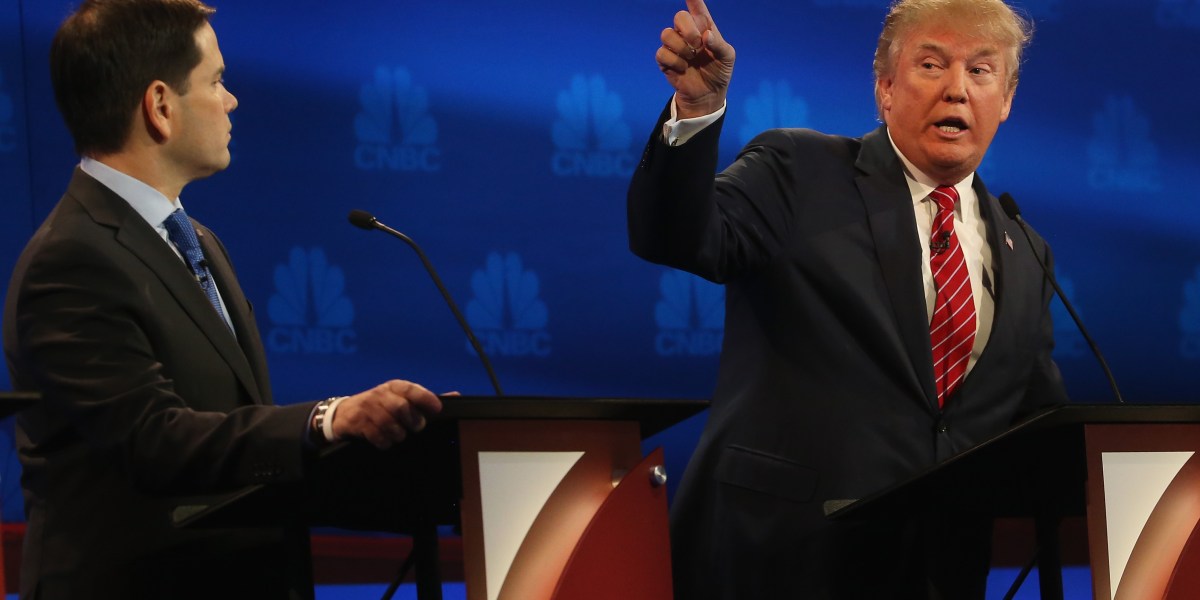How Trump's Presidency Will Shape Zuckerberg's Future

Table of Contents
Regulatory Scrutiny and Antitrust Actions
Trump's administration, despite its generally pro-business stance, initiated several investigations and regulatory actions targeting Facebook. While seemingly paradoxical, this scrutiny stemmed from concerns about Facebook's immense power and influence, issues that transcended partisan divides. The resulting legal battles and regulatory hurdles significantly impacted Facebook's operations and Zuckerberg's leadership style.
-
FTC antitrust lawsuits and their potential consequences: The Federal Trade Commission (FTC) launched a major antitrust lawsuit against Facebook, alleging monopolistic practices and harming competition. The potential consequences, including hefty fines and potential structural changes to Facebook, are far-reaching. This legal challenge forced Zuckerberg and his team to dedicate significant resources to legal defense, impacting their ability to focus on innovation and growth.
-
Congressional hearings and their impact on public perception: Zuckerberg faced intense questioning during numerous congressional hearings, grappling with issues ranging from data privacy to the spread of misinformation. These hearings significantly impacted public perception of Facebook and Zuckerberg, damaging the company's image and eroding public trust. The resulting negative publicity forced a reassessment of Facebook's public relations strategy and its approach to government relations.
-
State-level antitrust actions and their cumulative effect: Beyond the FTC lawsuit, multiple states also filed antitrust lawsuits against Facebook, adding to the cumulative pressure on the company. This multi-pronged legal assault underscored the widespread concern about Facebook's market dominance and the need for greater regulatory oversight. The cumulative effect of these actions forced Facebook to adopt a more defensive posture, impacting its long-term strategic planning and resource allocation.
The long-term implications for Facebook's business model are significant. Increased regulatory scrutiny necessitates substantial investments in compliance and risk management, potentially impacting profitability. Zuckerberg's leadership will be judged, in part, by his ability to navigate this complex regulatory landscape and maintain Facebook's market position.
The Spread of Misinformation and Political Polarization
Facebook's role in the spread of misinformation during Trump's presidency became a major point of contention. The platform's vast reach made it a fertile ground for the dissemination of false narratives, propaganda, and conspiracy theories, impacting elections and exacerbating societal divisions.
-
The impact of foreign interference during the 2016 election: The revelation of Russian interference in the 2016 US presidential election, leveraging Facebook to spread disinformation, exposed vulnerabilities in the platform's content moderation systems. This highlighted the immense responsibility Facebook carries in safeguarding democratic processes.
-
The ongoing struggle to combat fake news and harmful content: Facebook has invested heavily in technology and human resources to combat fake news and harmful content, but the challenge remains immense. The evolving nature of misinformation tactics necessitates constant adaptation and improvement in detection and response mechanisms.
-
The challenges of content moderation and censorship: Balancing the need to combat harmful content with the principle of free speech remains a significant challenge for Facebook. Decisions about content moderation are highly sensitive and prone to criticism, regardless of the approach taken. This ongoing debate continues to shape Facebook's policies and public image.
This period significantly impacted Zuckerberg's reputation and Facebook's public image. The association with the spread of misinformation damaged public trust and fueled calls for greater regulation and accountability.
International Relations and Geopolitical Shifts
Trump's foreign policy decisions created significant ripples for Facebook's global operations. Changes in international relations and geopolitical alignments necessitated adaptations in Facebook's strategies and approaches to different markets.
-
Changes in international data privacy regulations: The introduction of the GDPR (General Data Protection Regulation) in Europe and similar regulations in other countries forced Facebook to adapt its data handling practices globally. Compliance with these regulations required substantial investments and impacted Facebook's operational efficiency.
-
Impact on Facebook's expansion into new markets: Trump's trade policies and shifting geopolitical alliances affected Facebook's expansion plans in various countries. Navigating complex international relations and regulatory frameworks became critical for sustaining growth outside the US market.
-
Navigating differing regulatory landscapes across the globe: Facebook faces a patchwork of regulations across different countries, making consistent implementation of policies and standards challenging. Adapting to these varying requirements necessitates significant logistical and strategic adjustments.
These geopolitical shifts forced Zuckerberg to adopt a more nuanced and cautious approach to international expansion, prioritizing compliance with local regulations over rapid growth.
The Impact on Facebook's Business Model
The cumulative effect of regulatory scrutiny, misinformation controversies, and geopolitical shifts significantly impacted Facebook's business model.
-
Changes in advertising policies and practices: Increased scrutiny forced Facebook to revise its advertising policies and practices, impacting revenue streams. The need to prioritize user safety and data privacy impacted the type and volume of advertising permitted.
-
The impact of increased regulatory scrutiny on revenue: The legal battles and regulatory investigations diverted significant resources, impacting profitability and potentially hindering investment in future growth initiatives.
-
Adaptations to the evolving social media landscape: The challenges faced during Trump's presidency forced Facebook to adapt to an evolving social media landscape, prioritizing long-term sustainability over short-term growth.
The long-term viability of Facebook's business model hinges on its ability to adapt to these ongoing challenges, maintaining user engagement while complying with increasingly stringent regulations.
The Lasting Legacy of Trump's Presidency on Zuckerberg's Future
Trump's presidency irrevocably altered the landscape for Facebook and its CEO. The regulatory scrutiny, misinformation crises, and geopolitical shifts forced significant adaptations in strategy, resource allocation, and leadership style. The long-term implications for Facebook's future direction and Zuckerberg's leadership are profound and far-reaching. The company's ability to navigate these challenges will determine its future success and Zuckerberg's legacy. To delve deeper into how Trump's Presidency will shape Zuckerberg's future, explore reputable news sources and academic analyses of the intersection of technology and politics.

Featured Posts
-
 Indonesia To Export Rare Rice Varieties A Boost For Diplomacy And Trade
Apr 26, 2025
Indonesia To Export Rare Rice Varieties A Boost For Diplomacy And Trade
Apr 26, 2025 -
 Mangalia Shipyards Future Hangs In Balance As Turkish Desan Considers Acquisition
Apr 26, 2025
Mangalia Shipyards Future Hangs In Balance As Turkish Desan Considers Acquisition
Apr 26, 2025 -
 Jennifer Aniston And Chelsea Handler The Real Reason Behind Their Fallout
Apr 26, 2025
Jennifer Aniston And Chelsea Handler The Real Reason Behind Their Fallout
Apr 26, 2025 -
 Enhanced Naval Capabilities Fugro And Damens Collaboration With The Royal Netherlands Navy
Apr 26, 2025
Enhanced Naval Capabilities Fugro And Damens Collaboration With The Royal Netherlands Navy
Apr 26, 2025 -
 Guillaume Scheer Et Le Zuem Ysehuet Ouverture Le 13 Juin A Strasbourg
Apr 26, 2025
Guillaume Scheer Et Le Zuem Ysehuet Ouverture Le 13 Juin A Strasbourg
Apr 26, 2025
